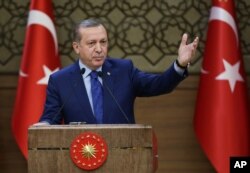Turkish President Recep Tayyip Erdogan is taking a more assertive stance in the Caucasus following the latest fighting between Armenia and Azerbaijan over disputed Nagorno-Karabakh.
Perched between the Russian, Ottoman, and Persian empires, Armenia and Azerbaijan have a long history of tension that began in 1988 when Armenia made territorial claims against Azerbaijan. As a result of the ensuing war, in 1992, Armenian armed forces occupied 20 percent of Azerbaijan, including the Nagorno-Karabakh region and seven surrounding districts.
Earlier this month, the reopening of the conflict regarding the disputed enclave of Nagorno-Karabakh attracted the attention of the international community, with President Erdogan pledging to return the area to Azerbaijan.
Former Turkish ambassador Murat Bilhan, who is the deputy chair of the Ankara-based Turkish Asian Center for Strategic Studies, says Erdogan’s comments reflect Turkish concerns about the recent fighting.
"It has touched a very sensitive chord in Turkish hearts because they are relatives and of course they support Azerbaijan whether they are right or wrong. They are supported," said Bilhan.
Azerbaijan and Turkey are frequently referred to in Turkey as "one people two countries." Support for Azerbaijan is particularly strong among Turkish nationalists and religious Turks, both key bases of support for the president.
Political scientist Cengiz Aktar of Istanbul’s Suleyman Sah University says with Erdogan pushing for greater presidential powers through a public referendum, he is looking to secure his voting base.
"The Turkish president is using any and everything to cajole the nationalist voter and on every occasion to use and abuse this nationalist sentiment," said Aktar.
Erdogan has also criticized neighboring Armenia, which he accused of being responsible for the latest clashes over Nagorno-Karabakh.
Armenia is a close ally of Moscow and observers say the Caucasus region could be becoming the latest region to exhibit tensions between Ankara and Moscow.
Erdogan slammed the failure of diplomatic efforts to tamp down an escalation of violence led by Moscow, Washington and Paris. Such statements have been interpreted by the Turkish media as Ankara opening the door to a military solution to the dispute over the enclave.
But Sinan Ulgen, a visiting scholar of the Carnegie Institute, says that would mark a major change in Turkish policy and would meet with internal resistance.
"It certainly points to a different, more activist direction in terms of what Turkey is willing to do. But it is still quite difficult for Erdogan by himself to change policy in this particular case. Because, at the end of the day, Turkish institutions have been cautious and prudent and do understand the international implications," said Ulgen.
Ulgen points out that Erdogan has, in the past, threatened to intervene in Syria, but was forced to step back in the face of resistance from his generals. However, some observers say, with the Turkish president continuing to secure greater political power and courting his nationalist voting base, a more assertive Turkish foreign policy could be likely.





